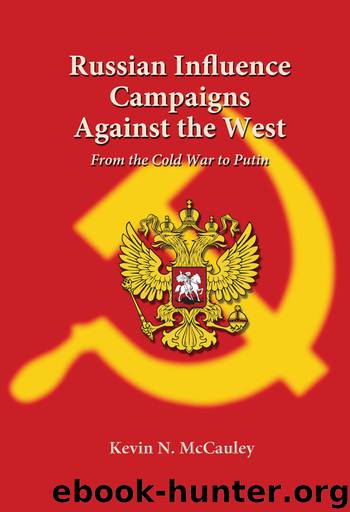Russian Influence Campaigns against the West: From the Cold War to Putin by Kevin McCauley

Author:Kevin McCauley
Language: eng
Format: epub, azw3
Published: 2016-10-11T23:00:00+00:00
CHAPTER 9
Reflection, Glasnost, and Aftermath
• • •
THE FAILURE OF THE ANTI-INF influence campaign, coming on the heels of the successful anti-ERW campaign shocked the front groups and their controllers in Moscow. In the wake of the failed campaign, the Soviet front groups experienced two reactions. The first was to question their part in the failure of the campaign. The second was to cast the blame on others. The front organizations blamed segments of the non-Communist peace movement in Western Europe as well as effective NATO planning and public relations for the influence campaign’s failure.
During this period in the mid-1980s, General Secretary Mikhail Gorbachev came to power in the Soviet Union with the policies of glasnost, perestroika, and new thinking that promised the reduction of tensions with the West and a new approach by Moscow. The new Kremlin policies were intended to save the Communist Party and relax the military confrontation with the West in order to rejuvenate the Soviet economy and technological base as the collapse approached. However, CIA analysis contended that Soviet active measures including propaganda and forgeries increased rather than declined during the periods of lessened tensions with the West, such as during détente. The reason was that the relaxation of tension only signaled a new phase of Moscow’s ideological struggle with the West, presenting new opportunities for the various facets of active measures to promote Soviet policies and objectives. A Soviet propagandist noted that “peaceful coexistence between states with different social systems not only does not mean peaceful ideological coexistence, but, on the contrary, presupposes the intensification of the struggle of ideas.”1
After a period of inaction, the Soviet leadership finally decided on several changes in the organization and strategic direction of the WPC and changes to the Soviet personnel and organizational structure, as well as initiating a new tactic contacting foreign groups and individuals directly. The Soviets needed to remake the front groups into a viable tool to influence elite and public opinion in the West. This was necessary to ensure the success of the anti-SDI (strategic defense initiative—popularly known as Star Wars) campaign, which began as the anti-INF campaign and was still in progress. The SDI, like ERW and INF in the past, represented a threat to Soviet interests and military posture. SDI threatened to cancel the large Soviet investment in ICBMs, a major tool for intimidation and deterrence. The SDI research and development (R&D) phase represented as much of a threat to Soviet interests as an actual deployment of an SDI system. Research developments threatened to increase the gap between Western and Soviet science and technology. The Soviet Union, which had worked on its own version of SDI since at least 1965, feared that an R&D race with the United States would take away vital resources from General Secretary Mikhail Gorbachev’s stated plan to revitalize the Soviet economy and industrial base.2 A further consideration was the fact that the US R&D effort would include technology spin-offs supporting the civilian sector, thereby leaving the Soviet standard of living even farther behind.
Download
Russian Influence Campaigns against the West: From the Cold War to Putin by Kevin McCauley.azw3
This site does not store any files on its server. We only index and link to content provided by other sites. Please contact the content providers to delete copyright contents if any and email us, we'll remove relevant links or contents immediately.
| Anthropology | Archaeology |
| Philosophy | Politics & Government |
| Social Sciences | Sociology |
| Women's Studies |
The Secret History by Donna Tartt(18208)
The Social Justice Warrior Handbook by Lisa De Pasquale(11957)
Thirteen Reasons Why by Jay Asher(8466)
This Is How You Lose Her by Junot Diaz(6455)
Weapons of Math Destruction by Cathy O'Neil(5844)
Zero to One by Peter Thiel(5503)
Beartown by Fredrik Backman(5369)
The Myth of the Strong Leader by Archie Brown(5244)
The Fire Next Time by James Baldwin(5025)
How Democracies Die by Steven Levitsky & Daniel Ziblatt(4966)
Promise Me, Dad by Joe Biden(4912)
Stone's Rules by Roger Stone(4867)
100 Deadly Skills by Clint Emerson(4696)
A Higher Loyalty: Truth, Lies, and Leadership by James Comey(4559)
Rise and Kill First by Ronen Bergman(4549)
Secrecy World by Jake Bernstein(4402)
The David Icke Guide to the Global Conspiracy (and how to end it) by David Icke(4386)
The Farm by Tom Rob Smith(4329)
The Doomsday Machine by Daniel Ellsberg(4250)
